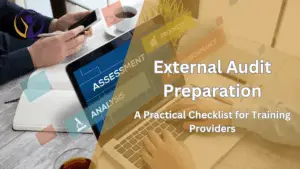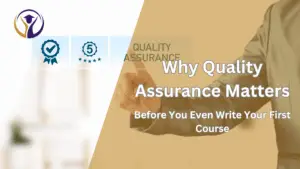Introduction
Quality assurance (QA) is essential for training providers to maintain high standards, comply with regulations, and deliver consistent learning experiences. However, many providers face challenges in managing QA effectively. Issues such as changing compliance requirements, assessment inconsistencies, and record-keeping difficulties can impact the quality of training.
This article explores some of the most common QA challenges training providers encounter and offers practical solutions to address them. Maintaining compliance and ensuring a high standard of education requires a structured approach and ongoing commitment to best practices. CQAS, as a specialist in quality assurance, provides guidance and support to training providers in these areas.
For more information on how we can support your quality assurance needs, visit CQAS Quality Assurance Services.
1. Keeping Up with Changing Regulations
Challenge:
Regulatory bodies frequently update their standards, and training providers must adapt quickly to stay compliant. Changes in requirements can affect course content, assessment methods, and certification processes. Failure to comply with updated regulations can impact accreditation status and the credibility of training programmes.
Solution:
- Regularly review updates from national and international accreditation bodies.
- Implement a QA framework that includes ongoing compliance checks and internal audits.
- Establish a structured system for tracking regulatory changes and updating policies accordingly.
- Providers can also seek external expertise from QA specialists like CQAS to ensure their training meets evolving standards.
Learn more about staying compliant with regulatory updates by checking out our Quality Assurance Support Services.
2. Ensuring Standardisation Across Assessments
Challenge:
When multiple instructors deliver the same course, maintaining consistency in assessment and grading can be difficult. Variations in evaluation criteria and feedback may lead to discrepancies in learner outcomes.
Solution:
- Develop clear and standardised assessment criteria that all instructors adhere to.
- Conduct regular standardisation meetings to align assessment practices.
- Use moderation processes to review assessment consistency and make necessary adjustments.
- Implementing structured assessment management systems can help ensure uniformity and fairness in grading.
For guidance on implementing structured assessment strategies, visit our Assessment Management Services.
3. Managing Digital vs. Paper-Based Record-Keeping
Challenge:
Many training providers still rely on paper-based record-keeping, which can lead to lost documentation, inefficiencies, and compliance risks. Transitioning to digital systems presents its own challenges, including data security and system integration.
Solution:
- Shift to digital record-keeping for improved efficiency and compliance tracking.
- Ensure that learner records are securely stored with appropriate access controls.
- Use cloud-based systems that allow for easier retrieval and audit readiness.
- Providers should follow best practices in digital compliance to ensure proper data management.
Discover how digital record-keeping can enhance your compliance efforts by exploring our Education Compliance Services.
4. Preparing for External Quality Assurance Audits
Challenge:
External QA audits can be stressful for training providers, particularly if documentation, assessment records, and compliance materials are not well-organised. Insufficient preparation can lead to delays or potential non-compliance issues.
Solution:
- Conduct internal audits in advance to ensure all documentation is complete and up to date.
- Develop an audit preparation checklist to track necessary requirements.
- Maintain thorough records of assessments, learner progress, and compliance reports.
- External expertise from QA professionals like CQAS can help training providers streamline their audit preparation.
Check out our Internal Education Audit Services to ensure your institution is prepared for external reviews.
5. Balancing Compliance with Innovation
Challenge:
Training providers aim to adopt innovative teaching methods, such as blended learning, AI-driven assessments, and micro-credentials, while still meeting compliance requirements. Striking this balance can be challenging.
Solution:
- Integrate QA best practices into new teaching methodologies.
- Conduct pilot runs of new training formats to assess compliance before full implementation.
- Keep up to date with accreditation body guidelines on modern training delivery methods.
- Regular review and adjustment of QA frameworks ensure that innovation aligns with compliance standards.
For support on integrating innovation while maintaining compliance, visit CQAS Accreditation Validation Services.
Conclusion
Addressing common QA challenges—such as keeping up with regulations, ensuring standardised assessments, managing records efficiently, preparing for audits, and integrating compliance into innovation—helps training providers maintain quality and credibility.
By implementing structured QA frameworks and staying informed about industry standards, providers can create effective, compliant, and learner-focused training environments. CQAS offers support and expertise to training providers seeking to strengthen their QA systems and enhance overall compliance and bring quality assurance in training.
For expert quality assurance support, visit CQAS today.
For industry best practices, visit The European Association for Quality Assurance in Higher Education (ENQA).


